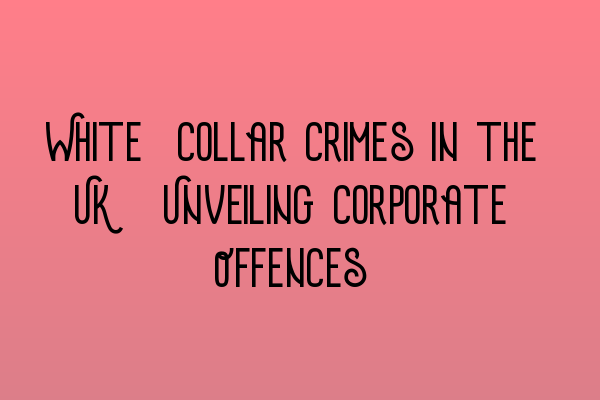White-Collar Crimes in the UK: Unveiling Corporate Offences
White-collar crimes have become increasingly prevalent in recent years, drawing attention to the unethical and illegal activities that occur within corporate settings. These types of crimes typically involve individuals in positions of power or responsibility, such as executives, managers, or professionals, who exploit their authority for personal gain. In the UK, corporate offences are a serious matter and are subject to legal investigation and prosecution.
Understanding White-Collar Crimes
White-collar crimes encompass a wide range of fraudulent activities, including embezzlement, bribery, insider trading, money laundering, tax evasion, and corporate fraud. The perpetrators of these crimes often operate within the corporate world, taking advantage of their positions to commit illegal acts.
Corporate fraud, in particular, is a significant concern for businesses and regulatory bodies alike. Fraudulent activities, such as false accounting, misrepresentation of financial information, or the misuse of company assets, can have severe consequences for both the organization and its stakeholders.
To combat white-collar crimes and hold individuals accountable, the UK has implemented various laws and regulations aimed at detecting, investigating, and punishing these offences. It is important for both businesses and individuals to be aware of these laws and the consequences they entail.
Corporate Offences in the UK
The UK has specific legislation in place to address corporate offences. The Companies Act 2006, for example, outlines various offences related to company officers, directors, and those involved in the management of a company.
One prominent corporate offence is the offense of misleading statements. This occurs when individuals knowingly or recklessly make false or misleading statements to induce others to invest in a company, resulting in financial loss. Misleading statements can include false accounts, misleading information about the company’s prospects or assets, or the intentional omission of relevant information.
Another corporate offence is the offense of bribery. The Bribery Act 2010 criminalizes the giving, receiving, or soliciting of bribes, both within and outside the UK. Companies can be held liable for failing to prevent bribery, unless they can demonstrate that they have implemented adequate anti-bribery procedures.
Consequences of Corporate Offences
Individuals and companies found guilty of corporate offences can face substantial fines, imprisonment, or both. In addition, the reputational damage caused by these crimes can be severe and long-lasting, resulting in the loss of business, trust, and credibility.
Defending against allegations of corporate offences requires expert legal representation. At SQE Criminal Law & Practice Law UK, our team of experienced solicitors specializes in handling white-collar crime cases. We offer comprehensive legal advice, defense strategies, and representation to individuals and companies facing allegations of corporate offences.
Conclusion
White-collar crimes and corporate offences pose a significant threat to the integrity of businesses and the financial landscape. The UK has taken proactive measures to combat these crimes and hold offenders accountable. Businesses and individuals must be aware of the laws, regulations, and consequences surrounding corporate offences to ensure compliance and minimize the risk of involvement in illegal activities.
To learn more about preparing for the SQE exams, such as SQE 1 Practice Exam Questions and SQE 1 Practice Mocks FLK1 FLK2, as well as SQE 2 Preparation Courses, visit our website. Stay updated with the latest SQE 1 Preparation Courses and SRA SQE Exam Dates to secure your legal career.
